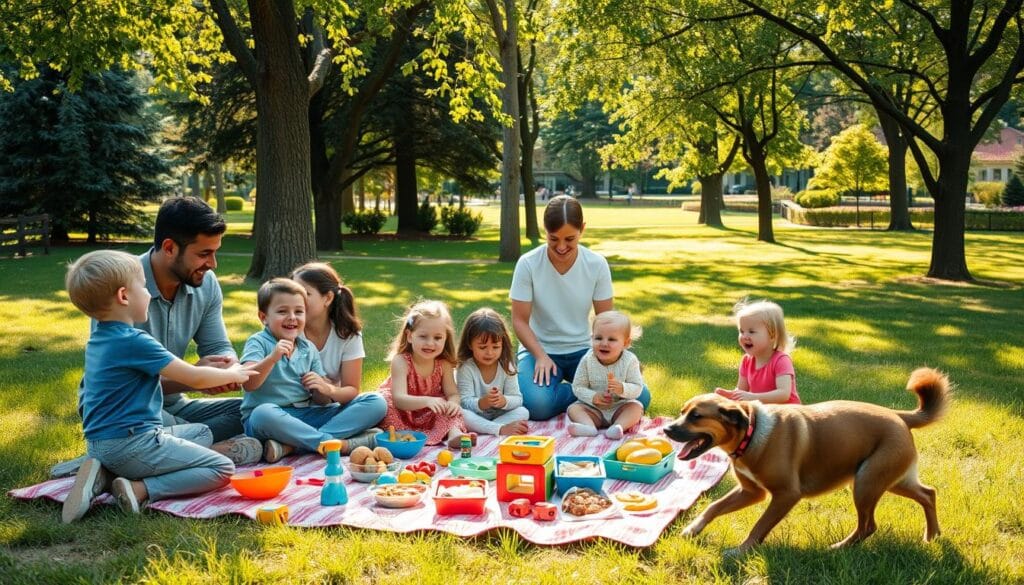Being a parent is both rewarding and challenging. The choices we make and the home we create deeply affect our kids’ happiness. In this guide, we’ll share key parenting tips to help you raise confident, well-adjusted kids.

Table of Contents
Cultivate a Nurturing Environment
Creating a positive atmosphere and open communication are key for a nurturing environment. These elements help parents build a home filled with emotional support and family bonding.
Creating a Positive Atmosphere
A positive atmosphere greatly impacts a child’s well-being. Parents should praise their children’s efforts and achievements, not just criticize. Celebrate the small wins and encourage optimism and resilience.
Keeping a calm and structured home also helps. It makes children feel secure and supported.
Fostering Open Communication
Open communication is vital in a nurturing environment. Parents should listen to their children’s thoughts, feelings, and concerns without judgment. Encourage them to speak freely and meet their needs.
This open dialogue builds trust and understanding. It makes children feel heard and valued.
By focusing on a positive atmosphere and open communication, parents can create a supportive home. This is essential for raising happy and well-adjusted children.
| Strategies for Cultivating a Nurturing Environment | Benefits |
|---|---|
| Praise children’s efforts and achievements Maintain a calm and structured household Encourage open dialogue and active listening Respond to children’s needs with empathy and understanding | Promotes a positive atmosphere and emotional support Fosters a sense of trust and security Strengthens family bonding and connection Helps children feel heard, valued, and understood |
“The greatest gifts you can give your children are the roots of responsibility and the wings of independence.” – Denis Waitley
Parenting Tips: Establish Routines and Boundaries
Consistency and structure are key for a child’s growth. Daily routines and clear boundaries help create a safe and stable home. This environment gives kids a sense of security and stability.
Setting age-appropriate schedules is crucial for effective parenting. Kids like knowing what to expect, which reduces their anxiety. A daily routine includes fixed times for meals, sleep, and play or learning activities.
- Establish a regular sleep schedule to ensure adequate rest and rejuvenation.
- Incorporate structured activities, such as reading, arts and crafts, or outdoor playtime, into the daily routine.
- Maintain a consistent bedtime ritual, such as a bath, story, and lights out, to signal the transition to sleep.
Clear boundaries are also vital for raising children. Setting clear expectations and consequences helps kids understand right from wrong. This includes rules for screen time, chores, and how to communicate respectfully.
| Boundary | Rationale |
|---|---|
| Limit screen time to 1 hour per day | Promotes physical activity, social interaction, and healthy brain development |
| Require completion of age-appropriate chores | Fosters responsibility, independence, and a sense of contribution to the household |
| Encourage respectful communication | Reinforces the importance of empathy, active listening, and conflict resolution |
By setting consistent daily routines and clear boundaries, parents give their kids the structure and consistency they need to thrive. This approach to parenting creates a stable and caring environment. It helps kids grow and reach their full potential.
Encourage Emotional Intelligence
It’s key for kids to develop emotional intelligence. By teaching them to be aware of their feelings and showing them how to handle them, parents can help. This way, kids learn to understand, manage, and share their emotions well.
Teaching Emotional Awareness
Help your kids know and name their feelings. Use simple words to talk about emotions like happiness, sadness, and anger. Talk about how their bodies and actions change with different feelings.
Make sure your kids feel safe to share their feelings. Accept their emotions and help them find good ways to deal with them.
Modeling Healthy Coping Mechanisms
Kids learn a lot from watching how parents handle tough times. Show them how to calm down by taking deep breaths or practicing mindfulness. This helps them see how to handle stress.
Teach your kids how to solve problems and try different ways to cope. Like writing in a journal, playing sports, or talking to friends and family. Let them find what works best for them.
| Emotional Intelligence Skill | Practical Strategies |
|---|---|
| Emotional Awareness | Identify and name emotions Discuss how emotions affect the body and behavior Provide a safe space for emotional expression |
| Emotional Regulation | Model healthy coping mechanisms Teach problem-solving skills Encourage exploration of personal coping strategies |
“Emotional intelligence is the ability to identify, understand, manage, and reason with emotions. It’s a crucial skill for children to develop for their overall well-being and success in life.”
Promote Positive Discipline Strategies
Effective positive discipline is key to good parenting. It helps children grow and solve problems. This part talks about the main ideas of positive discipline. It helps parents handle behavior management with ease.
Set Clear Expectations
Clear rules are the base of positive discipline. Parents should explain their rules in a way kids can get. This helps kids feel safe and know what’s expected.
Utilize Natural Consequences
Positive discipline uses natural consequences instead of punishment. When kids face the results of their actions, they learn more. This way, they understand cause and effect better.
Encourage Problem-Solving
Positive discipline is not just about stopping bad behavior. It’s also about teaching kids to solve problems. Parents help kids think of solutions and make good choices. This builds their critical thinking skills.
| Positive Discipline Strategies | Benefits |
|---|---|
| Set Clear Expectations | Provides structure and stability for children |
| Utilize Natural Consequences | Encourages responsibility and problem-solving |
| Encourage Problem-Solving | Develops critical thinking and decision-making skills |
Using these strategies, parents can help their kids grow and learn. They create a place where kids can learn, take responsibility, and feel emotionally smart. By setting clear rules, letting natural consequences happen, and helping with problem-solving, parents can help their family thrive.

“Discipline is not about punishing, it’s about teaching and guiding. It’s about creating an environment where children can learn and grow.”
Nurture Independence and Resilience
Teaching kids to be independent and resilient is key for good parenting. By encouraging self-reliance and helping them face challenges, parents help their kids grow strong. They become confident, problem-solvers ready to handle tough times.
Fostering Self-Reliance
Start by giving kids the freedom to make choices and take on tasks. Let them learn from their decisions and actions. This builds their confidence and sharpens their thinking.
As they get older, give them more independence. This lets them do things on their own and feel more capable.
Building Resilience Through Challenges
Teaching kids to bounce back from hard times is crucial. Instead of protecting them from everything, guide them through tough spots. Encourage them to find solutions and learn from mistakes.
By showing them how to be resilient and supporting them emotionally, parents help their kids grow strong. This way, they can face life’s ups and downs with confidence.
| Strategies for Nurturing Independence and Resilience | Benefits |
|---|---|
| Provide age-appropriate autonomy and responsibilities Allow natural consequences of decisions Gradually increase level of independence Guide children through challenging situations Encourage problem-solving and creative solutions Model resilient behavior and provide emotional support | Develop self-reliance and critical thinking skills Build resilience to overcome obstacles Foster a sense of empowerment and confidence Prepare children for future independence and success |
By teaching kids to be independent and resilient, parents help them grow into confident, problem-solving adults. These kids are ready to face life’s challenges with confidence and flexibility.
Prioritize Quality Time and Connection
Spending quality time with children is key for their emotional and social growth. In today’s fast world, it’s easy to get lost in daily tasks. But, it’s vital to carve out time for meaningful moments with your kids.
Building a strong parent-child connection and bonding greatly impacts a child’s well-being. By focusing on quality time and shared activities, you can strengthen your family relationship. This will benefit your children in many ways.
- Engage in one-on-one activities: Set aside dedicated time each day or week to spend with your child individually. This could be as simple as taking a walk, playing a game, or having a conversation without distractions.
- Participate in shared hobbies and interests: Discover your child’s passions and make an effort to join them in their favorite activities. Whether it’s playing sports, exploring nature, or engaging in creative pursuits, these shared experiences can deepen your parent-child connection.
- Foster open communication: Encourage your children to share their thoughts, feelings, and concerns with you. Listen attentively, and create an environment where they feel safe and comfortable expressing themselves.
- Celebrate milestones and accomplishments: Recognize your child’s achievements, no matter how small, and express your pride and admiration. This reinforces the bond between you and helps them feel valued and supported.
By prioritizing quality time and nurturing strong family relationships, you create a foundation of trust, security, and love. This foundation will serve your children well throughout their lives.
| Activity | Benefits |
|---|---|
| Reading together | Promotes literacy, imagination, and bonding |
| Cooking/baking together | Teaches life skills, fosters collaboration, and creates shared memories |
| Outdoor adventures | Encourages physical activity, exploration, and connection with nature |
| Game nights | Enhances problem-solving skills, communication, and laughter |
“The most important thing that parents can do is to spend time with their children.” – Dr. Jane Goodall
Foster Curiosity and Lifelong Learning
It’s key to encourage a child’s curiosity and love for learning. This helps them grow intellectually. By creating a space that encourages exploration, parents can help their child understand the world.
Encouraging Exploration and Discovery
To spark curiosity, give kids chances to explore and learn. Let them ask questions and try new things. Hands-on activities are great for sparking their imagination.
Here are some ways to encourage this:
- Set up interactive learning stations at home
- Go on outdoor adventures and nature walks
- Let kids try different materials and art
- Visit museums and science centers
- Make reading fun by providing lots of books
By letting kids explore and learn at their own pace, parents can help them stay curious. This builds a lifelong love of learning.
| Activity | Benefits |
|---|---|
| Science Experiments | Encourages exploration and discovery through hands-on learning |
| Nature Walks | Promotes curiosity about the natural world and child development |
| Storytelling | Sparks imagination and lifelong learning through narrative exploration |
By embracing a child’s curiosity and love for learning, parents can help them grow intellectually. This encourages a love for exploration and discovery.
“The important thing is not to stop questioning. Curiosity has its own reason for existing.” – Albert Einstein
Embrace Co-Parenting and Support Systems
Parenting can be easier with the help of co-parenting and a strong support network. Co-parenting means working together with others to care for a child. It helps create a stable home where kids can grow well.
Creating a good co-parenting relationship takes open talks, respect, and a focus on the child’s needs. When co-parents team up, they offer a consistent approach to parenting. This helps the child and makes life easier for the parents, allowing them to balance work and family better.
Having a wide support network is also key. Family, friends, and community groups can offer emotional and practical help. Looking for parenting classes, support groups, and local organizations can connect parents with others and valuable advice.
| Benefits of Co-Parenting | Community Resources for Parental Support |
|---|---|
| Consistent discipline and values Reduced stress and burden on individual parents Improved communication and collaboration Stronger emotional and social development for the child | Parenting classes and workshops Support groups and playgroups Family resource centers Online forums and discussion boards |
By embracing co-parenting and using parental support, families can build a caring environment. This environment supports the emotional, social, and physical growth of children. These resources help parents face the ups and downs of co-parenting with strength and confidence.

Celebrate Individuality and Diversity
It’s key to celebrate a child’s unique personality and the family’s diversity. This helps their growth and self-esteem. Every child is special, with their own strengths and interests. By valuing these, we create a supportive space for them to flourish.
Respecting Unique Personalities
Children are like unique masterpieces, full of talents and quirks. Parents should aim to understand and love their children’s individuality. This lets kids feel confident and true to themselves.
Promoting Inclusivity and Acceptance
In today’s world, inclusivity and acceptance are vital in families. Celebrating differences helps kids grow empathetic and understanding. Parents can lead by example, introducing diverse cultures and experiences. This builds a welcoming and accepting home.
FAQ
What are some essential tips for creating a nurturing environment for children?
To create a nurturing space, start with a positive vibe. Talk openly and offer emotional support. Let kids share their feelings and listen well.
How can parents establish effective routines and boundaries for their children?
Start with daily routines and clear rules. This helps kids feel secure. Make sure to explain the rules clearly.
What strategies can parents use to encourage emotional intelligence in their children?
Teach kids to recognize and share their feelings. Show them how to handle emotions well. Help them learn to solve problems.
How can parents promote positive discipline strategies?
Use positive methods like setting clear rules and consequences. Avoid harsh punishments. Guide your child’s behavior in a positive way.
What are some ways to nurture independence and resilience in children?
Give kids some freedom and help when needed. Support them through tough times. Celebrate their wins and teach from failures.
Why is it important to prioritize quality time and connection with children?
Quality time and strong bonds are key for kids’ growth. Do things together, have one-on-one time. Make your family feel safe and connected.
How can parents foster curiosity and a love of learning in their children?
Make learning fun by encouraging exploration. Support their interests and offer hands-on learning. Help them see the joy in learning.
What are the benefits of effective co-parenting and accessing support systems?
Good co-parenting and support systems make parenting better. Work well with co-parents and use community help. It’s a big help.
Why is it important to celebrate a child’s individuality and diversity?
Respecting a child’s uniqueness and diversity is vital. Create a welcoming space for everyone. Celebrate what makes each child special.

2 thoughts on “Essential Parenting Tips for Raising Happy Kids”
Comments are closed.